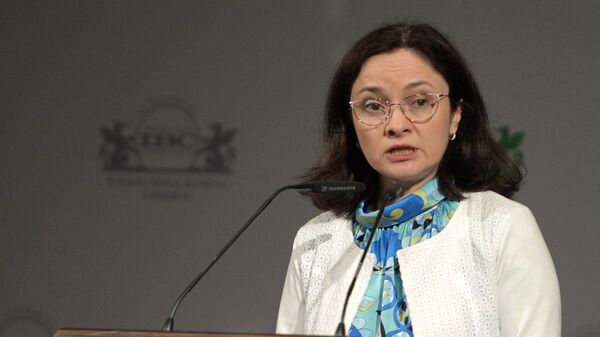MOSCOW, November 10 (Sputnik) – The Russian Central Bank has dumped the idea of developing a stress scenario for the development of the economy that would account for oil prices hitting $60 per barrel and believes oil prices will not drop below $80 per barrel up to 2017, the bank said in a statement Monday.
The most pessimistic economic forecast also takes into consideration western sanctions that will most likely remain in place until the end of 2017, the statement reads. The Central Bank's base scenario suggests that oil prices will reach $95 per barrel in 2015 and will be corrected to $92 per barrel by 2017.
“The results on the net personal outflow of capital for 2014 is assessed at the level of $128 billion, which is higher than the forecast,” the statement reads.
Russia’s economy will be stable even if the price of oil in 2015-2017 remains at $80 per barrel
The country’s Central Bank can use instruments to slow inflation to 6-6.5 percent in 2015 and to 4-4.6 percent to the end of 2017, Central Bank First Deputy Chair Kseniya Yudayeva said.
“The Russian economy will be stable even if the price of oil remains at $80 per barrel throughout 2015-2017 and [western] sanctions are not reversed. The Central Bank has instruments it can use in any development of events to gradually lower inflation to 4.0-4.6 percent by the end of 2017, and approximately 6.0-6.5 percent in 2015,” Yudayeva said.
Yudayeva said Russia’s economy would grow by more than 3 percent under favorable conditions, but even if conditions turned negative, the economy would still have a positive outcome by 2017.
According to Yudayeva, in a favorable development of events, Russia's economy will grow by more than 3 percent by 2017, but even if conditions turn negative, the economy will still show positive growth.
The Russian financial regulator, however, has significantly raised its capital outflow forecast for 2014 to $128 billion against $90 billion previously expected.
Early in October, Yudayeva announced that the Russian financial regulator was working on a shock scenario for financial policy in the case of a plunge in oil prices. There were three options in the scenario, with the toughest of them suggesting an action plan should prices fall to $60 per barrel.
Russian Economic Development Minister Alexei Ulyukayev said, however, that he does not believe in such a dramatic price decline. The Russian Finance Ministry said that it expects global oil prices to stabilize at $90 per barrel in the medium-term, although there could be a short-term fall in 2015.
Senior politicians, including President Vladimir Putin and Finance Minister Anton Siluanov, repeatedly stated that Russia's 2015 budget for will be executed in any macroeconomic situation, regardless of inflation, oil prices or any other factors.
Elvira Nabiullina: Russia's Central Bank plans to temporarily limit ruble liquidity for banks
“We will temporarily limit ruble liquidity because it’s not only being used for financing the economy, but also for playing on the currency market,” bank head Elvira Nabiullina said.
Elvira Nabiullina said the Central Bank would step in whenever it needs to in order to regulate the growth of speculative demand on the currency market.
“The Central Bank will ingress onto the currency market whenever and in whatever volume that is needed in order to curb the speculative demand," Nabiullina said.
She also said that the Central Bank would halt regular currency intervention, in particular the sale of $350 million a day if the rate of the ruble drops lower than the level defined by regulations.
On November 5, the Central Bank said that it drastically decreased its support for the national currency, which has weakened the ruble. The ministry added it was pursuing the transition to free floating currency exchange rates.
On November 8, the Russian Economic Development Ministry said it did not expect a recession in the first quarter of 2015, though noting that the period between February and March 2015 could be acute.
Russia's Economic Development Minister Alexei Ulyukayev said that the ruble's exchange rate would strengthen in the short term, stressing that there was no need to introduce foreign exchange restrictions.
Earlier on Monday, Russian President Vladimir Putin said that Russia expected the ruble's fluctuation to end soon and was ready to use currency intervention, if necessary, in order to stabilize the market.
"We are currently observing speculative jumps in the exchange rate [of the ruble] but this will soon end, keeping in mind the actions the Central Bank is taking in response to speculators on the currency market," Putin said.
Russia's national currency, the ruble, has lost about a quarter of its value since the beginning of 2014.
In recent months Russia's economy has been exhibiting signs of a minor slowdown due to geopolitical tensions and Western sanctions over Russia's alleged role in the Ukrainian crisis and falling oil prices.
According to the European Commission's forecast published earlier in November, a gradual recovery of the Russian economy may be expected only in 2016.


